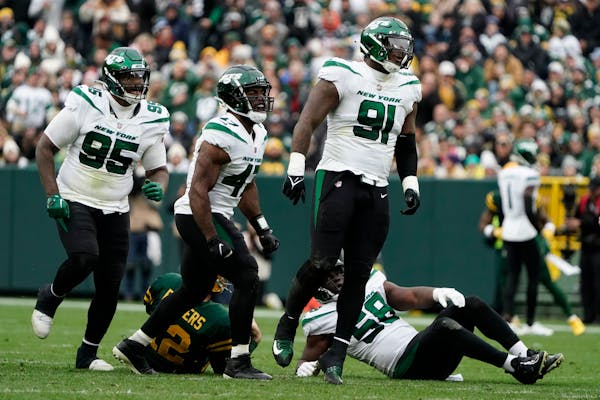 See
more of the story
See
more of the story
MIAMI GARDENS, FLA. — The next time a talking head on an NFL show uses the words "offensive genius,'' take offense and turn the channel.
Unless they're talking about Joe Gibbs.
And especially if they're talking about anyone in today's game.
What we have relearned in this strange NFL season is that offensive genius is almost always a collective and serendipitous effort, requiring the right general manager, head coach, offensive coordinator, quarterback, offensive line and receivers at the right time and place.
Consider this fact, Vikings fans: Bill Belichick, the consensus pick for the greatest coach in NFL history (at least in the Super Bowl era), has a record of 74-82 when Tom Brady isn't his quarterback.
This season, Brady, with injuries at offensive line and receiver, is 3-3, having lost on Sunday to a struggling Pittsburgh team.
Belichick's .474 winning percentage without Brady is worse than the winning percentage of every Vikings head coach since Bud Grant, with the exception of Leslie Frazier, who was saddled with a bad team as an interim coach and then saddled with the failing Christian Ponder in his last season.
The other winning percentages: Kevin O'Connell .833, Mike Zimmer .562, Brad Childress .527, Dennis Green .610, Jerry Burns .547, Grant .621.
This season, Sean McVay, Matt LaFleur and Zac Taylor, highly regarded offensive minds with star quarterbacks, are a combined 9-9.
Highly regarded offensive minds like Kyle Shanahan, Mike McDaniel, Belichick, Kevin Stefanski and Kliff Kingsbury are 13-17.
Future Hall of Fame quarterback Russell Wilson, playing for a supposed offensive guru in Nathaniel Hackett, is 2-4 after losing Monday and looking like a wide-eyed rookie.
Perhaps the best pure passer in NFL history, Dan Marino, never won a Super Bowl.
O'Connell and Kirk Cousins have combined to lead the Vikings to a 5-1 record, but their offense has been sporadic at best, with only Justin Jefferson, among the skill-position players, on pace for an impressive season.
A conclusion: Offensive coaches can't succeed without quality quarterback play, and quality quarterbacks rarely succeed without functional offensive lines and playmaking skill-position players.
We don't know how Belichick's career would have gone if not for Brady, although it seems clear now that Brady was the greater driver of success in New England.
Another example: Former Vikings offensive coordinator Brian Billick was thought to be a passing-game genius when he coached Randy Moss and Cris Carter in '98.
When he won a Super Bowl with the Ravens, he won on the strength of an all-time great defense, excellent special teams and a strong running game. He passed only as a last resort.
There is only one obvious example in modern NFL history of a coach winning regardless of who plays quarterback or carries the ball: Gibbs.
Gibbs took Washington to three Super Bowl titles with three different non-Hall of Fame quarterbacks: Joe Theismann, Doug Williams and Mark Rypien. He won with three different primary ballcarriers in the Super Bowl: John Riggins, Timmy Smith and Earnest Byner. He won with one Hall of Fame position player, receiver Art Monk, and a powerhouse offensive line.
What lesson does this context provide? Expecting O'Connell to perform magic in the short term, while teaching a new system to established players, is unrealistic.
And in the long term, his job is to win games regardless of offensive statistics and superlatives.
Billick did it.
So did Bill Parcells, who won with defense, a running game and situational intelligence.
Parcells won one Super Bowl with Phil Simms. He won another, upsetting the offensively superior Bills, with backup quarterback Jeff Hostetler, ancient running back Ottis Anderson and no star receivers.
He even took the Jets to an AFC Championship Game with a 42-year-old Vinny Testaverde at quarterback.
Given the quarterbacks they won with, Gibbs and Parcells might be the two greatest coaches of the Super Bowl era.
Their résumés offer a reminder that O'Connell's job isn't to win pretty, and that offensive wizardry can be overrated.
O'Connell's job is to win often. Through six games, he's done that.


